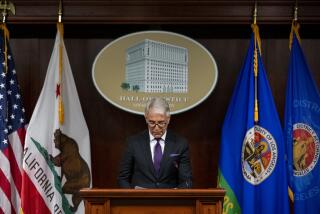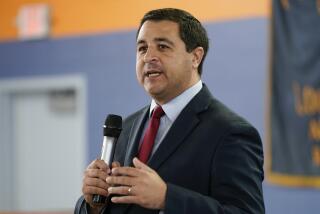Carmony Defender Tries to Shift Blame
- Share via
SANTA ANA — The defense attorney for GOP political aide Rhonda Carmony said in court Thursday it is not believable that she orchestrated the illegal circulation of petitions on behalf of a spoiler candidate in last year’s 67th Assembly District special election.
Attorney Creighton Laz stopped short of saying the plan instead was carried out by the office of Assembly Speaker Curt Pringle (R-Garden Grove), but he indicated that is the direction Carmony’s defense will take.
Laz, speaking during a pretrial hearing, attacked the credibility of two GOP aides who pleaded guilty to taking part in the scheme and later testified against Carmony before the Orange County Grand Jury. Laz said that both worked for Pringle and were in Pringle’s campaign office along with his deputy chief of staff, Jeff Flint, as the plan was unfolding last September.
“They deal with Flint on a daily basis. He tells them what to do and when to do it. . . . This is their boss,” Laz said. “They are going to do this without talking to their boss? That is not credible testimony.”
Carmony is charged with three felonies for her alleged role in recruiting a decoy Democrat for the ballot in the November special election, which was won by Republican Scott Baugh of Huntington Beach. Baugh replaced Doris Allen, who was recalled the same day. One month later, Baugh provided the crucial vote that elected Pringle speaker of the Assembly.
Jeff Gibson and Mark Denny, the two former GOP aides who in March pleaded guilty to misdemeanors for their roles in the scheme, have testified that Carmony asked them to circulate petitions for the decoy candidate, Laurie Campbell, and that Flint played no role in the scheme.
“Clearly, part of our defense at any trial would be that Denny and Gibson took orders from Flint and that he and Pringle could fire them,” Laz said in an interview after the hearing. “It is absurd to think those people were taking orders from Rhonda.”
A spokesman for Pringle’s office did not return telephone calls for comment.
The statements by Laz are the first public indication that Carmony’s defense could encompass an effort to blame Flint--and possibly Pringle--for the effort to recruit Campbell in the hope of siphoning votes from the other Democrat in the race. Carmony, campaign manager for Rep. Dana Rohrabacher (R-Huntington Beach), has refused all interviews since she was indicted in March, and Laz has been reserved in his comments about the case.
The same grand jury indicted Baugh on four felony counts of perjury and 18 misdemeanor counts for allegedly lying on campaign and other finance disclosure statements. Baugh was charged with deliberately omitting a $1,000 contribution from Campbell to hide his connection with the decoy candidate. Baugh has vigorously defended his innocence.
As part of its investigation into wrongdoing in the 67th Assembly District campaign, the grand jury also indicted Baugh chief of staff Maureen Werft on two felonies for allegedly registering and voting illegally in the November 1995 election.
The leading Democrat in that race, Linda Moulton-Patterson, pleaded guilty last month to a single misdemeanor count of fraudulently filing a nominating petition.
Laz and Carmony were in court Thursday asking Superior Court Judge James L. Smith to dismiss the three felony indictments against Carmony for lack of evidence. Carmony is charged with one count of fraudulently making a nomination paper, one count of fraudulently filing a nomination paper, and conspiracy to make and file a fraudulent nominating paper.
While it is not illegal to recruit a decoy candidate, state law requires that the circulator of nominating petitions attest under penalty of perjury that he or she witnessed the signatures. In the Campbell case, Gibson and Denny have admitted to circulating several of her petitions knowing that they would not sign them as the witness. In all, Campbell signed eight different petitions that Republican aides circulated for her.
At the hearing Thursday, Smith allowed all three indictments against Carmony to stand but ruled that there was insufficient evidence before the grand jury to support one prosecution theory behind the conspiracy indictment. The fraudulent-filing leg of the conspiracy count remained, however, because Smith noted there was evidence Carmony met with Campbell and Gibson in a car at the registrar of voters office, where Campbell signed the documents and then filed them.
After prosecutors objected that Smith did not take into account evidence contained in the 2,400-page grand jury transcript, Smith allowed them 24 hours to file a motion for reconsideration.
Smith also reset the earliest possible trial date for Carmony and Baugh, moving it to Sept. 3.
More to Read
Get the L.A. Times Politics newsletter
Deeply reported insights into legislation, politics and policy from Sacramento, Washington and beyond. In your inbox twice per week.
You may occasionally receive promotional content from the Los Angeles Times.










